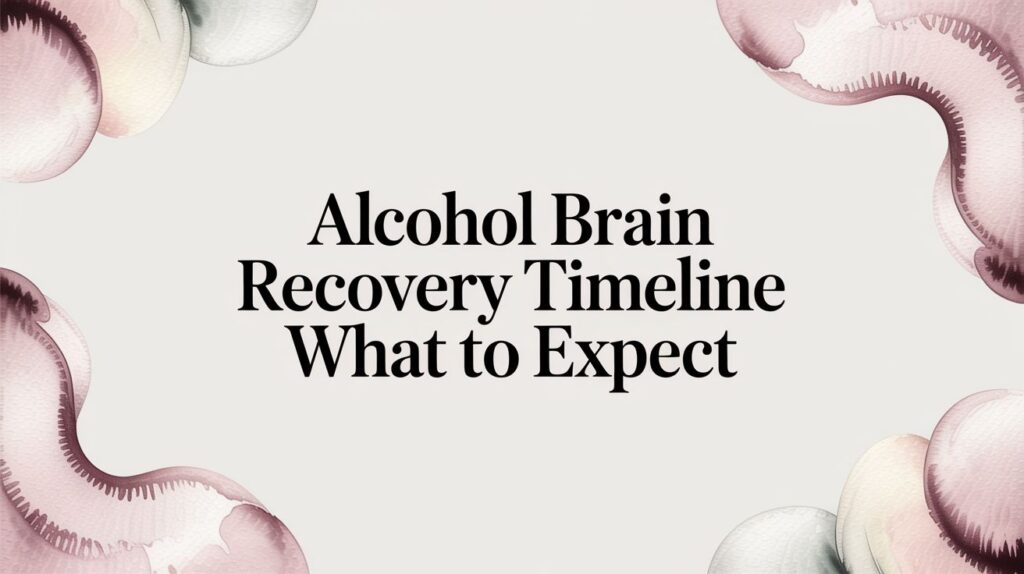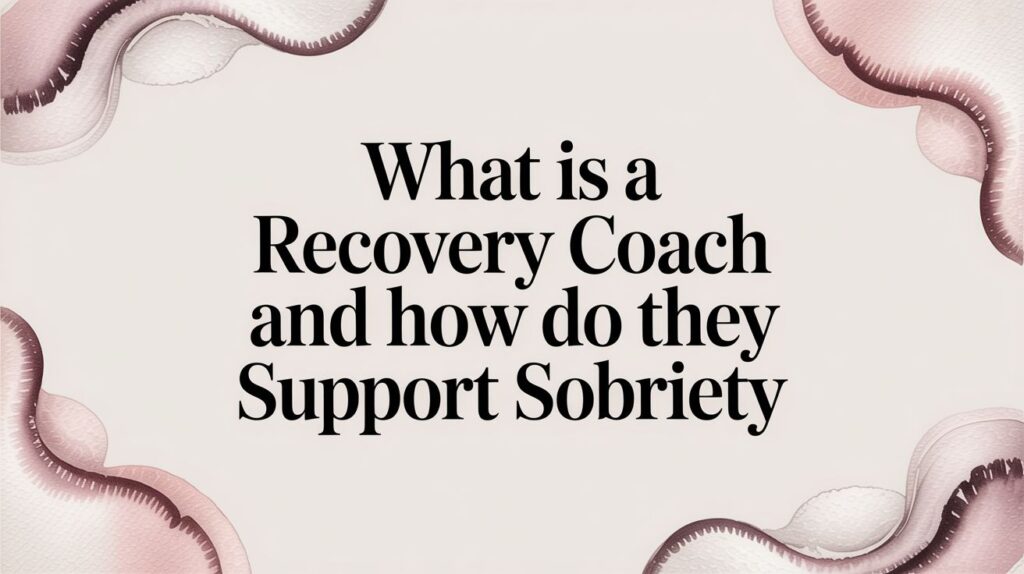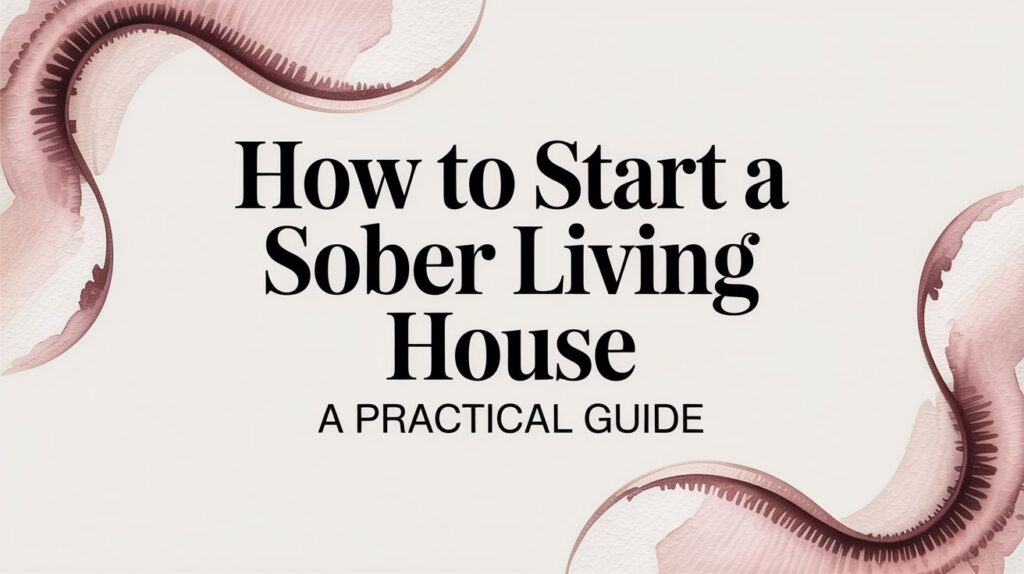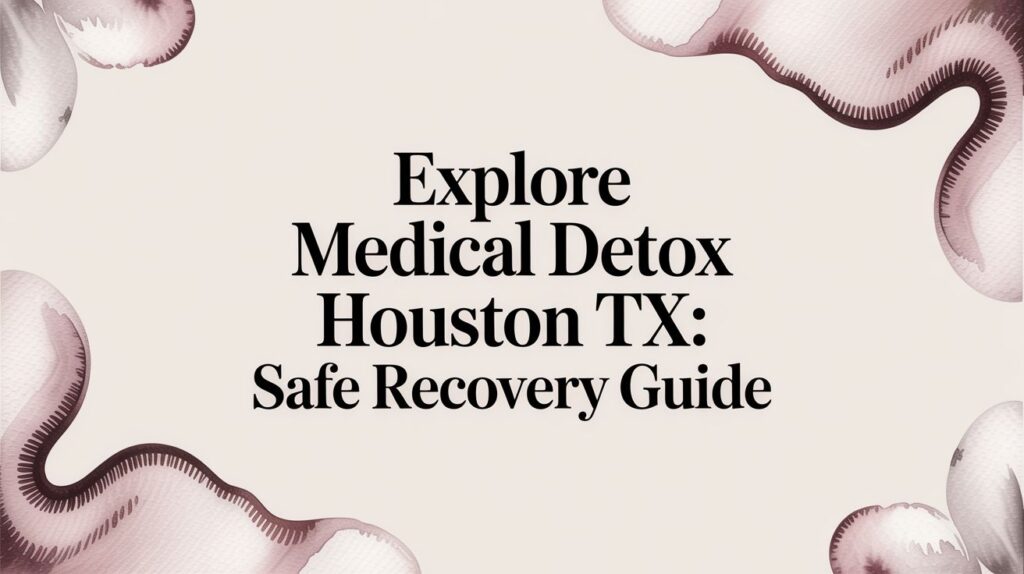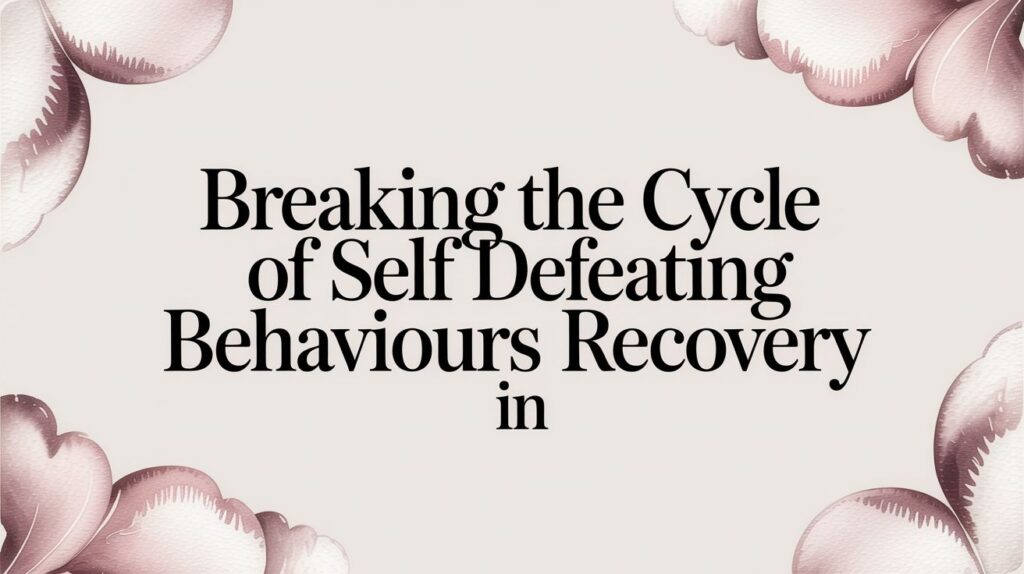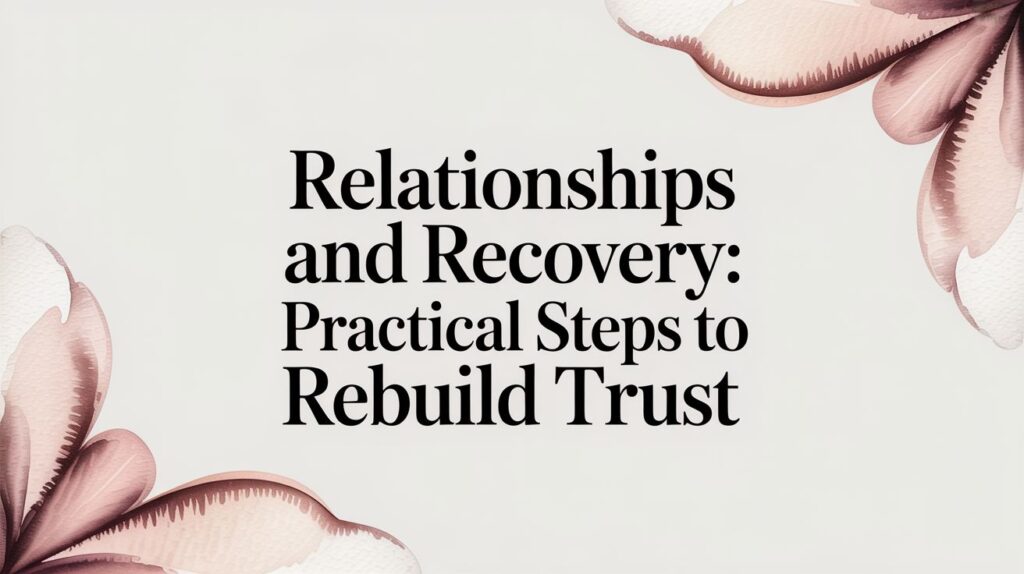The first seven days after you stop drinking are often the most intense.This is when your brain works overtime to get its chemical balance back on track, and while that process can trigger withdrawal symptoms, it's also the very first sign of incredible healing.
The First Week: Your Brain's Initial Reset
The moment you quit drinking, your brain kicks off a massive rebalancing act. Think of it like a ship that’s been sailing through a relentless storm—once the winds die down, it takes time for the vessel to steady itself in calm waters. For a long time, alcohol was suppressing certain brain functions while artificially cranking up others. Now, your brain has to find its natural equilibrium again.
The two main players in this neurological drama are GABA (gamma-aminobutyric acid) and glutamate. Alcohol acts like a megaphone for GABA, the brain's primary "calm down" signal, while simultaneously muting glutamate, the "get going" signal. When alcohol suddenly disappears, the brain is left with a system that’s been wired to overcompensate, leading to a state of over-excitement that causes those familiar withdrawal symptoms.
What to Expect Day by Day
Everyone’s experience is a bit different, but the first week generally follows a predictable pattern as your brain adapts.
- First 24-48 Hours: This is usually when the brain's hyperactivity peaks. You might feel anxious, shaky, or struggle with insomnia. Intense cravings are also common as your system practically screams for the substance it learned to depend on.
- Days 3-5: For many, this is the toughest stretch. Withdrawal symptoms can intensify before they start to ease up. Staying hydrated is non-negotiable, and it's always wise to have medical supervision if symptoms feel severe. This is a critical window where learning new coping skills for substance abuse can make all the difference.
- Days 6-7: Toward the end of the week, the most severe physical symptoms usually start to fade. Your brain begins to stabilize, and you may notice the first glimmers of mental clarity and a more even-keeled emotional state.
This initial timeline is all about your brain's powerful, built-in drive to heal itself.
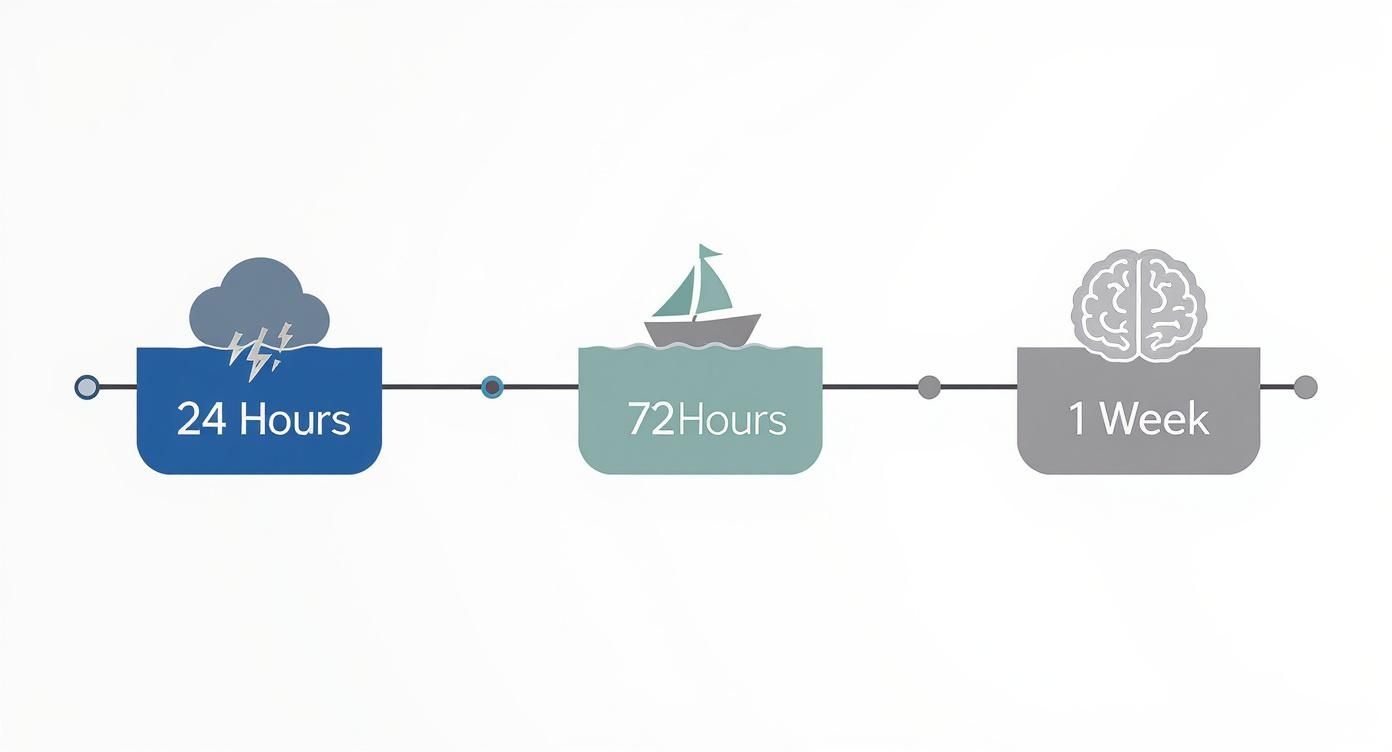
As you can see, those first 24 hours are often the most turbulent, but by the one-week mark, you've already made huge strides toward finding your neurological footing again.
The first week of sobriety isn't just about getting through withdrawal; it's about witnessing your brain's incredible capacity to begin healing itself. Each hour and each day marks a victory in recalibrating your neural circuitry for a healthier future.
Understanding what’s happening on a chemical level can be incredibly empowering. This first week lays the groundwork for all the deeper healing to come in the following weeks and months. Knowing the science behind the symptoms can help you navigate this phase with more confidence and give yourself the compassion you deserve.
The First Month: Rebuilding Neural Pathways
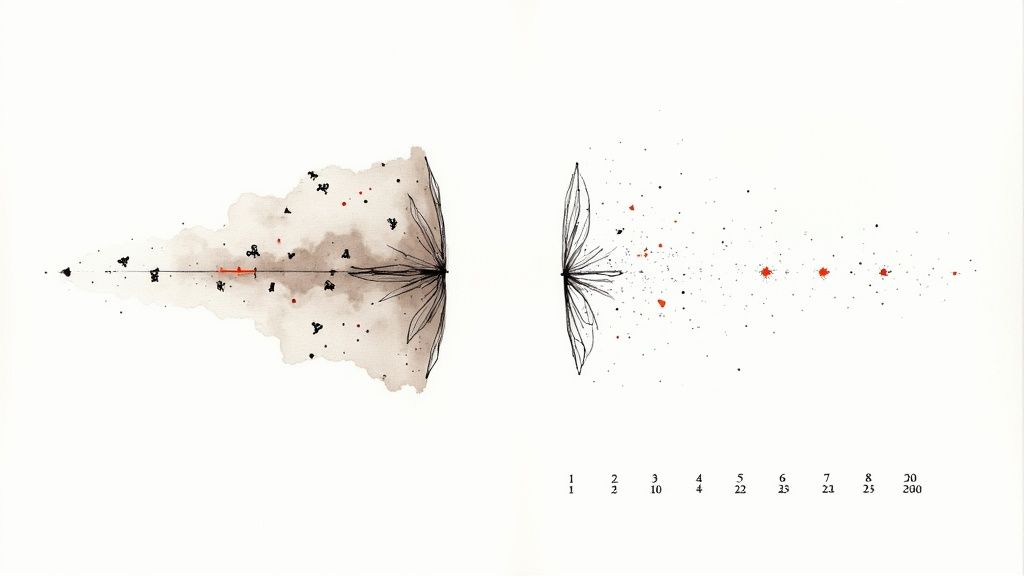
Once you’ve made it through the storm of acute withdrawal, your brain’s incredible capacity for change—a process called neuroplasticity—takes center stage. Think of this month as a skilled construction crew arriving after a hurricane. They aren’t just clearing debris; they’re actively rebuilding damaged structures and pouring a stronger foundation.
This is exactly what’s happening inside your head. Your brain is starting to mend and reinforce the neural pathways that alcohol damaged.
During this period, the hyperactivity that fueled those intense, early cravings finally begins to quiet down. As your neurotransmitter levels continue to find their balance, you'll start noticing real, tangible improvements in your day-to-day life. This isn't just a feeling; it's the physical evidence of your brain healing itself.
Key Milestones in the First Month
This phase of recovery is often marked by some seriously encouraging progress. While everyone’s journey is different, many people report hitting similar positive milestones.
- Improved Short-Term Memory: Suddenly, you remember where you put your keys. The grocery list in your head actually stays there. This is a sign that the hippocampus, a key player in memory, is getting back online.
- Enhanced Focus and Concentration: That persistent brain fog finally starts to lift. Tasks that felt impossible just weeks ago—like finishing an article or staying focused in a meeting—become manageable as your prefrontal cortex regains its strength.
- Better Sleep Patterns: As your brain chemistry stabilizes, your natural sleep-wake cycle can finally reset. This leads to deeper, more restorative sleep, which is absolutely critical for cognitive repair and keeping your emotions in check.
These early victories are huge motivators. They are the clear, undeniable proof that your hard work is paying off in your brain’s health and your overall quality of life.
The first month of sobriety is where neuroplasticity truly becomes your greatest ally. Your brain isn’t just recovering; it's actively remodeling itself for a healthier, more resilient future, laying down new pathways that support clarity, stability, and control.
Research backs this up, showing that significant gains in brain health often appear within just 3 to 4 weeks of quitting. The brain starts to dial down neuronal hyperexcitability—that frantic state tied to cravings and relapse risk.
This calming effect is a cornerstone of early recovery. As you support this healing process, understanding what cognitive behavioral therapy is can give you the mental tools to lock in these positive changes. These neurological repairs link directly to a better mood and a lower chance of relapse.
It’s also a great time to learn about the crucial role of B vitamins in brain health, since heavy drinking often depletes these essential nutrients. This first month sets a powerful precedent for the deeper, long-term healing still to come.
Three to Six Months: Regaining Cognitive Clarity
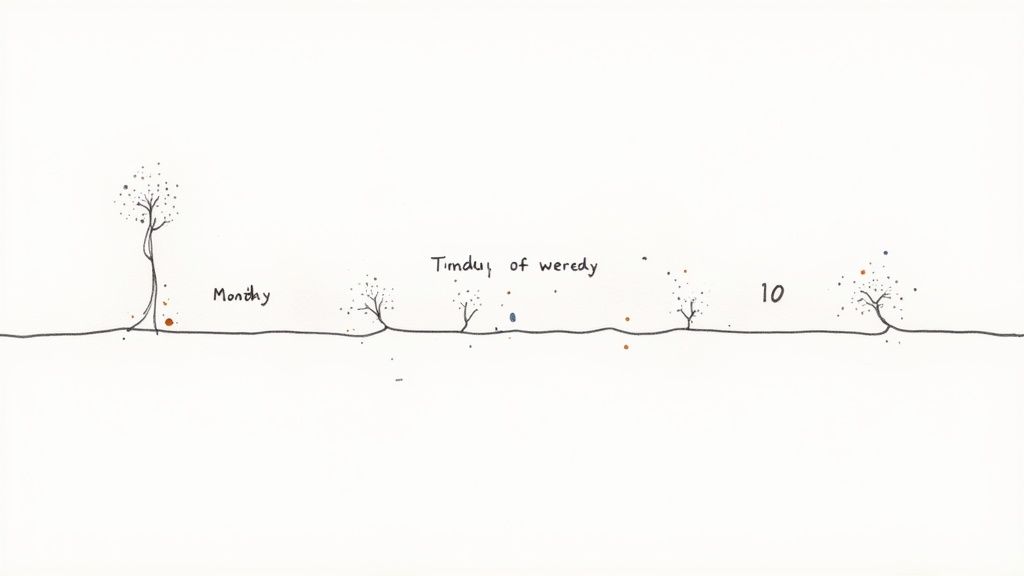
Once you hit the three-to-six-month window of sobriety, the nature of your brain’s recovery starts to shift in a big way. The initial, all-consuming phase of just getting stable gives way to something much more rewarding: a noticeable return of your mental sharpness.
If the first couple of months were about shoring up a crumbling foundation, this stage is about putting the furniture back in the rooms. Higher-level thinking, emotional depth, and complex problem-solving start coming back online, and it feels incredible.
The persistent brain fog finally begins to lift, replaced by a clarity you might have thought was gone for good.
Reversing Damage and Recovering Volume
One of the most profound things happening under the hood right now is brain volume recovery. We know that chronic, heavy drinking can literally cause certain parts of the brain to shrink. The good news is that with sustained abstinence, this isn't necessarily permanent.
During this period, key areas can start to regain some of that lost volume, a physical change that you can feel in your day-to-day life.
- The Hippocampus: This is your brain's memory librarian. As it heals, you'll likely notice it's much easier to learn new things and pull up old information.
- The Cerebellum: In charge of coordination and balance, the recovery here translates to better motor control. You might just feel less clumsy and more physically steady.
- The Cerebral Cortex: This is the brain's executive suite, responsible for all the high-level stuff. As it repairs, you'll find your decision-making, impulse control, and analytical skills are much sharper.
These changes aren't just abstract concepts happening in a lab; they show up in real life. You might find yourself confidently handling a complex project at work or navigating a tough conversation with a loved one with more patience and insight.
This is the timeframe where all the hard work of staying sober really starts to pay off in your cognitive bank account. The brain moves beyond basic survival and repair and starts optimizing for performance again.
For a deeper dive into how memory and brain function rebound, the latest neuroscience insights into memory and brain health offer some fascinating context that can be a great motivator.
What Regained Clarity Feels Like
The improvements you feel between months three and six can be genuinely life-altering, reinforcing your decision to stick with it.
- Navigating Work with Ease: Tasks that felt impossible just a few months ago now seem manageable. You can follow complicated discussions in meetings, contribute thoughtful ideas, and organize your day without feeling overwhelmed.
- Richer Social Connections: You’re more present. Your ability to listen and tune into others' emotions comes back, helping you rebuild trust and deepen the bonds with the people who matter most.
- A Stronger Sense of Self: As your thinking clears up, so does your sense of who you are. You start to trust your own judgment again and feel more capable of handling whatever life throws at you without needing to reach for a drink.
This stage is a powerful reminder of the brain's incredible resilience. While the journey is far from over, the three-to-six-month mark is often when people truly feel like they are getting their mind back—and it’s a feeling worth fighting for.
One Year and Beyond: The Long-Term Healing Journey
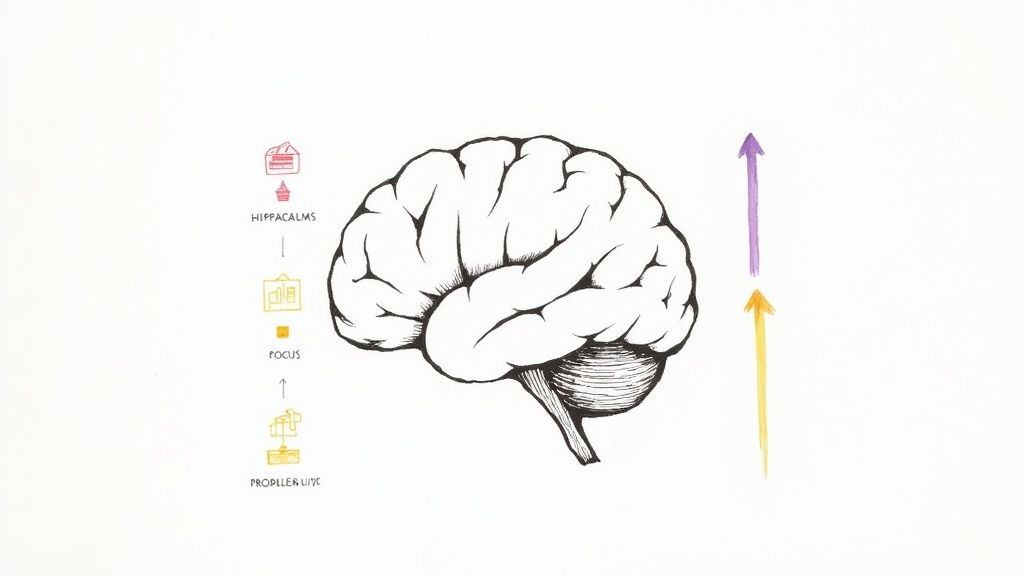
Hitting the one-year mark of sobriety is a huge deal. It’s a monumental achievement worth celebrating, but it’s important to see it as a key milestone, not the finish line. The brain’s healing journey doesn't just stop here; instead, it shifts gears from rapid, urgent repair to steady, sustained improvement.
This long-term phase is where the really deep, lasting changes take root. With alcohol no longer disrupting its delicate chemistry, the brain can finally focus on optimizing its own performance. One of the most incredible processes that kicks into high gear during this time is neurogenesis—the actual creation of new brain cells. While this happens throughout our lives, sustained sobriety creates the perfect environment for it to flourish, especially in the parts of the brain vital for learning and memory.
Continued Cognitive and Emotional Growth
The progress you see after a year is often less about dramatic, overnight shifts and more about cementing a new, healthier baseline. This ongoing healing process brings noticeable upgrades in a few key areas.
- Stable and Resilient Moods: With neurotransmitter systems like serotonin and dopamine finally functioning more normally, emotional regulation becomes much more consistent. You’ll likely find you're better equipped to handle stress and less prone to those sudden, jarring mood swings.
- Sharpened Executive Functions: Complex mental skills—things like long-term planning, making sound decisions, and controlling impulses—continue to get stronger. This mental fortification is crucial for navigating life’s challenges and seriously lowers the risk of relapse.
All the physical and cognitive recovery that happens in the first year really sets the stage for this continued progress. Studies show that even by one month of abstinence, there are measurable health benefits like a 25% drop in insulin resistance and a 6% dip in blood pressure. That initial momentum of healing slows down after the first few months, but it absolutely continues as long as sobriety is maintained.
After one year, brain recovery becomes less about fixing what was broken and more about building a stronger, more resilient mind than ever before. Sustained sobriety doesn't just return you to a pre-alcohol state; it builds a new foundation for lasting well-being.
It’s also important to keep a realistic perspective. For people with a history of very heavy, long-term drinking, some cognitive effects might linger. But the overwhelming evidence shows that the brain has an incredible capacity for ongoing repair. The many benefits of getting sober stretch far beyond this initial year, offering a hopeful outlook for anyone committed to the journey.
Every single sober day contributes to a healthier brain, paving the way for a future defined by clarity, stability, and control.
Your Recovery Timeline Isn't a Straight Line
The brain's healing process after you quit drinking isn't a one-size-fits-all map. It's less like a rigid train schedule and more like a personal road trip—everyone’s destination might be the same, but the route, speed, and detours will be completely unique. Comparing your progress to someone else’s is a fast track to discouragement because a few key factors dramatically shape how your brain bounces back.
Getting a handle on these variables helps you set realistic expectations and, more importantly, practice some self-compassion. The goal isn’t speed; it’s consistent forward movement. Just as everyone’s relationship with alcohol is different, so is their path away from it.
Duration and Intensity of Alcohol Use
One of the biggest variables is your personal history with alcohol. It stands to reason that someone who drank heavily for 20 years will face a longer and more complex recovery journey than someone who drank heavily for two years. The longer the brain has had to adapt to alcohol's presence, the more repair work it has to do.
But it’s not just about the years. The intensity of your drinking matters, too. For instance, binge drinking puts a very different kind of acute stress on the brain compared to daily, moderate consumption. The bottom line is, the harder your brain had to work to compensate for alcohol, the more time it will need to recalibrate once it's gone.
Age and Overall Health
Your age when you stop drinking also plays a big part. Younger brains tend to have more neuroplasticity—that amazing ability to reorganize and form new connections—which can sometimes lead to a quicker rebound in cognitive function. But let’s be clear: recovery is absolutely possible at any age.
Your overall physical health is another huge piece of the puzzle. A well-cared-for body creates a much better environment for your brain to heal. Think of it like this:
- Nutrition: A diet packed with vitamins, especially B vitamins like thiamine, provides the raw materials your brain needs for neural repair.
- Exercise: Getting your body moving increases blood flow to the brain, which helps promote the growth of new cells and sharpens cognitive function.
- Sleep: Quality sleep is totally non-negotiable. It’s when your brain does most of its heavy lifting—clearing out toxins and consolidating repairs.
Co-Occurring Conditions and Genetics
Mental health conditions like depression, anxiety, or PTSD often go hand-in-hand with alcohol use. These co-occurring disorders can complicate the recovery timeline because they also impact brain chemistry and function. It's critical to address both the substance use and the underlying mental health issue at the same time for healing to stick. For anyone navigating this dual challenge, understanding your options for support is a key first step. You can get a clearer picture by exploring what is covered with insurance for addiction treatment.
Genetics can also play a role, predisposing some people to certain vulnerabilities while giving others a bit more resilience during recovery.
Research confirms that brain recovery from alcohol can be a long-term process, sometimes lasting up to two years. The healing timeline is profoundly influenced by the severity of alcohol abuse and the presence of other mental health conditions, which can extend the journey. Learn about the facts of brain recovery from alcohol on matcareclinics.com.
Ultimately, it’s the unique mix of all these factors that will shape your personal timeline. Recognizing this frees you to focus on your own progress, celebrate your own milestones, and give yourself the grace to heal at your own pace. This is your journey, and every single step forward is a victory.
Common Questions About Brain Recovery From Alcohol
As you navigate the timeline of brain healing after quitting alcohol, a lot of questions are bound to pop up. Getting clear, straightforward answers can make all the difference, providing both the clarity and the motivation you need to keep moving forward.
Let's tackle some of the most common concerns. Having this information helps you set realistic expectations and appreciate just how resilient your brain truly is. Everyone's path is a little different, but the core principles of healing are the same for us all.
Can the Brain Fully Recover From Alcohol Damage?
Absolutely. The brain’s power to rewire and heal itself, a process known as neuroplasticity, is nothing short of incredible. For most people who maintain sobriety, significant recovery of both brain structure and cognitive function is not just possible—it's likely. Research shows that brain volume can increase and key skills like memory and problem-solving often improve dramatically within the first year.
Of course, the degree of recovery hinges on a few things, like how long and how heavily you drank, your age, and your overall health. While the vast majority of people see substantial improvements, some long-term, heavy drinkers might have some lingering deficits.
The most important thing to remember is this: quitting alcohol gives your brain the best possible shot at healing itself. Sobriety unlocks its natural capacity for repair, paving the way for a clearer, healthier future.
How Long Does It Take for Brain Fog to Clear?
Ah, brain fog—that maddening feeling of confusion, forgetfulness, and a total lack of focus. It's one of the most common complaints in early sobriety, and for good reason. Most people report a major lifting of this mental haze within the first month as their brain chemistry starts to stabilize. The worst of it usually subsides after the first one to two weeks.
It's completely normal, however, for milder waves of brain fog to pop up for several months as your neural pathways continue their repair work. You can help things along by focusing on good nutrition, drinking plenty of water, getting consistent exercise, and prioritizing quality sleep. It’s a gradual process, but sticking with sobriety is the single most effective solution.
What Can I Do to Speed Up Brain Recovery?
While your brain has its own natural healing timeline, you can absolutely give it a boost. Think of these lifestyle choices as providing your brain with the premium fuel and high-quality tools it needs to rebuild efficiently.
Here are the key strategies that make a real difference:
- Eat a Nutrient-Rich Diet: Zero in on foods packed with antioxidants and B vitamins. Thiamine is especially critical, as alcohol depletes it and it's vital for neurological function.
- Get Regular Aerobic Exercise: Physical activity is a game-changer. It ramps up blood flow to the brain, which helps grow new neurons and sharpens your thinking.
- Prioritize Quality Sleep: This is non-negotiable. Deep, restorative sleep is when your brain does most of its heavy lifting—repairing damage and cleaning out toxins. Aim for a consistent schedule.
- Keep Your Mind Active: Challenge your brain by reading, learning a new skill, or even just doing puzzles. This helps build and reinforce new, healthy neural connections.
On top of these, learning to manage stress and getting professional help for any co-occurring mental health conditions will create the ideal environment for your brain to thrive.
At Altura Recovery, we understand that every recovery journey is unique. Our evidence-based outpatient programs in Houston provide the personalized support you need to navigate your brain's healing process while maintaining your daily life. Learn how our compassionate, expert team can help you build a foundation for lasting sobriety and well-being. Visit us at https://www.alturarecovery.com.

